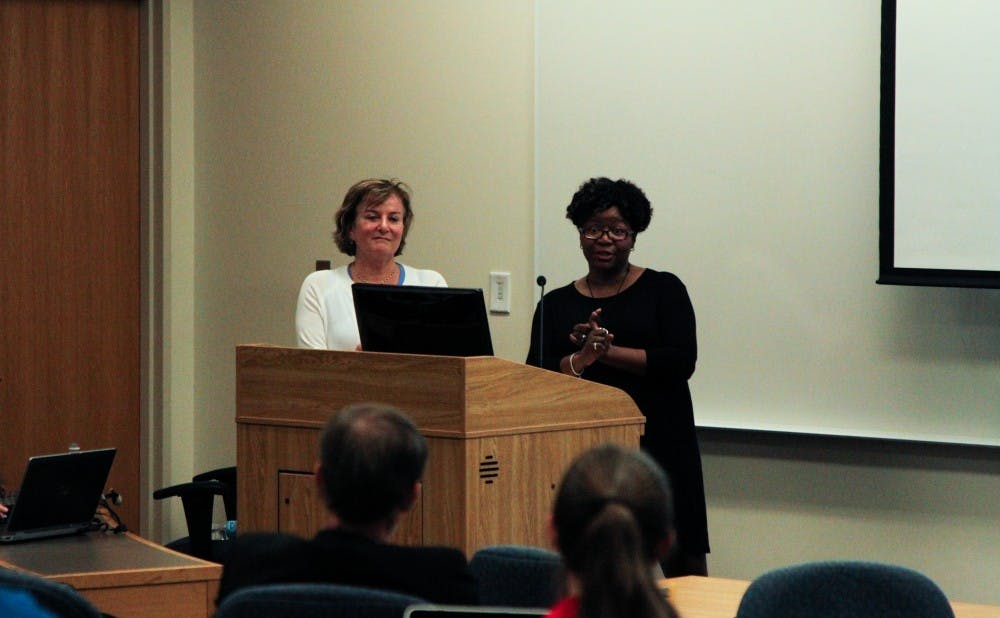The Academic Council reviewed the proposed strategic plan for the University and heard hiring updates for Duke Kunshan University at its Thursday meeting.
The strategic plan, versions of which have previously been put out in 2006 and 2001, describes the University's trajectory and guiding principles. Provost Sally Kornbluth and Susan Lozier, vice provost for strategic planning and Ronie-Richelle Garcia-Johnson professor of earth and ocean sciences, presented a final version of the strategic plan entitled “Together Duke: Advancing Excellence Through Community.” Three themes encompass the plan—inquiry and discovery, the Duke opportunity and global engagement.
“We realized that at its heart this University is all about its people and ideas,” Lozier said. “From very beginning, we said if interactions and collisions are the key in creating new knowledge, then what we need in our community is people who bring new ideas.”
She noted that the plan involves ways to provide a transformative experience for every student and recruit diverse faculty and students to form a more vibrant community. It also aims to foster global engagement, shifting the focus from location-based initiatives in specific places to theme-based ones that involve problems encountered by communities around the globe.
Other goals include broadening opportunities for graduate and professional students, along with cultivating an inclusive campus community and enhancing alumni engagement around the world, Kornbluth explained.
The plan requires a “down payment” of $132 million to execute, Kornbluth said, adding that the “lion’s share” of the money will go toward faculty.
Moving forward, the strategic plan will guide the University’s fundraising goals, much like the last strategic plan did for the Duke Forward campaign. The two most recent strategic plans include “Making a Difference” and “Building on Excellence."
“We understand that this plan is a road map and not a contract,” Kornbluth said. “If implemented well, we’re going to have an even more robust community of scholars and learners.”
Roxanne Springer, professor of physics, noted that the part of the plan referencing campus community did not mention the issue of sexual assault. This is problematic considering a recent survey found that 40 percent of undergraduate women at Duke reported being sexually assaulted since enrolling, she said.
Kornbluth agreed about the importance of tackling this issue, adding that collective effort from both students and faculty would be needed. She said that more explicit language about how to address the problem could be included in the plan.
The Academic Council will vote on endorsing the plan at its May meeting, and it will then go to the Board of Trustees for final approval.
Jennifer Francis, vice provost for academic affairs and Douglas and Josie Breeden professor at Fuqua, presented a report on the hiring process for DKU faculty members. Three faculty search committees have reviewed more than 1,200 applications thus far. They have received about an equal number for positions in natural science, social science and arts and humanities departments.
“There have been amazing conversations that we’ve been having,” Francis said. “There are truly some outstanding candidates out there, and I couldn’t be more thrilled.”
The committees have reduced the candidates down to a pool of 125 candidates and are conducting Skype interviews with them. In addition to regular faculty positions, the committees are also looking at the possibility of hiring DKU fellows—post-graduate fellowships for Duke Ph.D. students that would include both teaching and research elements.
Hiring for the language and writing faculty is headquartered at DKU because of the large number of qualified bilingual faculty in China, Francis explained.
The committees will eventually hire between 20 and 25 faculty members for DKU.
In other business:
The Council reviewed potential revisions to Appendix N of the Faculty Handbook, which outlines the position of ombuds. Ombuds facilitate the resolution of allegations by faculty and staff that policy violations have occurred.
In Spring 2014, the Council expressed concerns about the unclear definition of the ombuds role, and an Ombuds Review Committee was formed. The Council’s Diversity Task Force also proposed recommendations for ombuds.
Emily Klein, professor of earth and ocean sciences, and Trina Jones, professor of law, presented the proposed changes, which increase clarification of the role and its functions as well as the independence and confidentiality of ombuds. The Council will vote on these recommendations at its May meeting.
The Council also elected Tom Metzloff, professor of law, as the next faculty ombudsman. He will replace Jeffrey Dawson, professor emeritus of immunology and associate dean emeritus for basic medical science curriculum in the School of Medicine.
Get The Chronicle straight to your inbox
Signup for our weekly newsletter. Cancel at any time.

